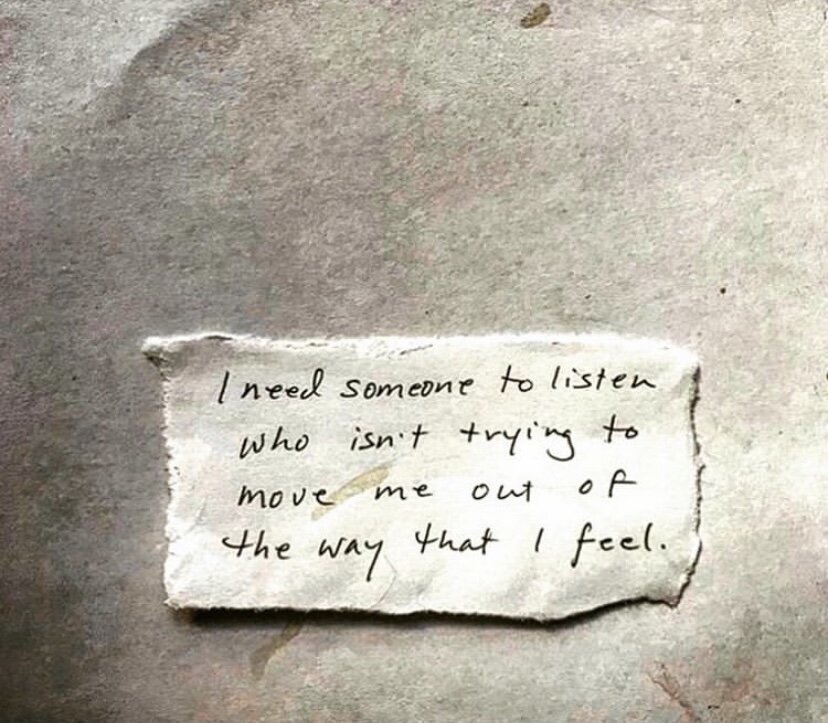JUST LISTEN
When someone shares their pain with you, how do you respond? Do you try to give them a positive outlook, or reassure them, or jugde them, or fix the problem? Do you ever say «at least it’s not…», «it could be worse» or «you don’t have to feel this way»? Most of those reactions are related to our own discomfort of not knowing what to do, and our lack of ability to sit with our own pain, not to mention someone else’s.
The suffering of another can bring forth strong discomfort for those who witness it. And usually, people want to fix, whatever is going on, or at least make it better. The paradox is, that if you say or do the things mentioned above- to make someone feel better, you actually just end up making them feel worse. Because now, they are not only feeling their original pain, they are rejected and dismissed, maybe even shamed, for it, too. Marginalizing someone’s pain and trying to give someone perspective (e.g. «it could be worse») instead of validating their emotional experience, regardless of the validity of those statements, will only create greater damage. It’s usually not perspective or advice people need when they’re suffering, but empathy and understanding.
The message of «you shouldn’t feel a certain way» communicates that a person’s emotional experience isn’t a valid one, that it is inaccurate, insignificant, and/or unacceptable. Invalidation is the process of denying, rejecting or dismissing someone’s feelings, and it’s one of the most damaging forms of emotional abuse which can add extra weight to whatever burden someone is carrying. The invalidated person will often leave a conversation feeling confused, invisible, crazy, small and full of self-doubt. The well-intentioned invalidators often defend that the goal is to help someone feel better or differently- to an emotion they judge as a more accurate, more valid one. However, the truth is, you have no authority to decide how a person should or shouldn’t feel. Only they know that!
This encouraging of emotional dismissal, leads to even greater psychological distress, not only in the short-term, but especially over time. When we brush aside, suppress or minimize feelings, we inevitably cause the emotions to grow. These emotions will find a way to be expressed, possibly sideways or in an unhealthy matter. Or through aches and pains, digestive troubles, panic attacks, emotional eating, drugs, alcohol, etc.
Real life human emotional difficulties are not solved this way. It can be very triggering having someone trying to change the way you feel, and yet, this is the common ground as to how we meet other people in their struggle and pain. We deny our own feelings, and because of it, we deny the feelings of others. In order to sit with the pain of others, we have to be able to sit with our own pain, first.
DOS
So how can we hold space for another? (First, learn how to hold space for yourself) Listen, without judgement. Look for feelings. Sit in the feelings with them. Validate their emotions. The pressure of having to fix another, also makes supporting someone, tiring. Fixing someone else, requires a lot. What if we understood that true support, what we call ‘holding space’ don’t have to be that draining? I’m not saying that holding space is easy, but at least it takes off the pressure we put on ourselves to save the other person. You don’t have to save anyone. You don’t have to fix anything. You just have to be present, and listen.
«I see you.»
«I hear you.»
«I can see you’re really struggling.»
«This must be so painful.»
«I don’t know how this must feel, but I can imagine that it’s really hard.»
«I totally understand that you’re upset.»
DON’TS
Avoid saying that you know how they feel (read: you don’t, you never do, no matter how similar the situation is) and shifting the focus over to yourself by speaking about your history, how you have experienced the same, and therefore know what the feeling is like. This comparison can feel offending, and pain should never be compared. This is not to say that we can never share our own experiences, but there is a time and place for everything. Hearing «I know how you feel» from someone who haven’t even been close to experience what you are experiencing, if that’s the case, is belitteling, anyways. Avoid offering unsolicited advice. Advice you haven’t asked for, is the worst. If you have an idea on how to solve their problem, ask: «do you want my help with this problem?» If the answer is «no,» focus on listening. And of course, try your best. We all mess up from time to time, and the point isn’t to never do. We stumble and fall, and act from our level of awareness. Our capacity to hold space always reveals our own emotional state, and how much inner work we’ve done. So be honest, with whoever you are trying to support. If you’re unsure of how to handle the situation, say so, and ask them what they need. How you can help. How you can support. This humbleness will make you just that; supportive.
«Please dance inside my struggle with me. It is the only thing that will help. And yes, if done well, you will struggle a bit also. This is how to love me, you and us.»

